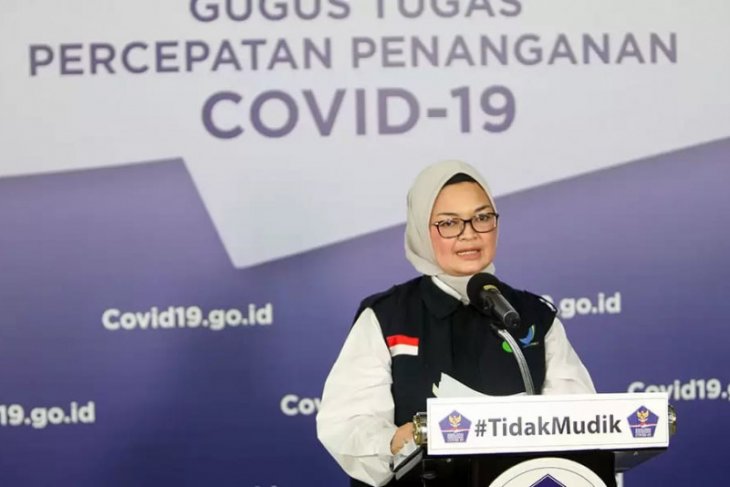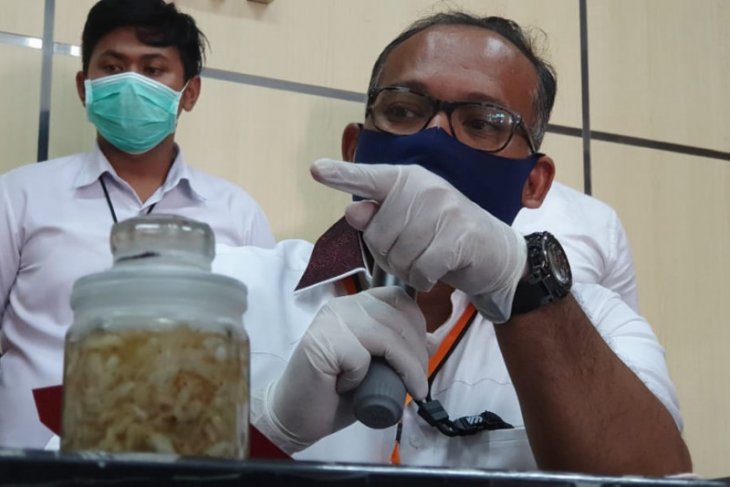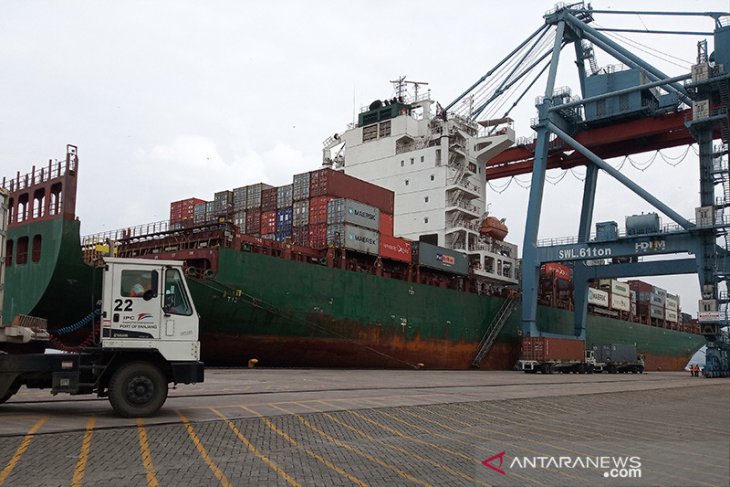Live Streaming
Program Highlight
Company Profile
Task Force Confirms 30,098 Volunteers Join to Stem COVID-19 Spread
Written by Ani HasanahSome 30,098 medical and non-medical volunteers have joined the forces to stem the spread of the COVID-19 disease caused by a new type of coronavirus, according to the COVID-19 task force volunteer coordinator Andre Rahadian.
"We are cooperating with various social and youth organizations, so that despite over 30 thousand having registered, the number of those working on the field reaches more than 100 thousand," he stated during a press conference in Jakarta on Wednesday.
Rahadian noted that out of the 30,098 volunteers, 7,115 were medical volunteers and 22,983 were non-medical volunteers spread across Indonesia, though 70 percent are on duty in Java, the epicenter of the spread of COVID-19.
"As many as 80 percent of them are 40 years of age and under, so they are relatively safe from contracting COVID-19 and can work optimally," he stated.
In addition to volunteers under the Task Force for the Acceleration of Handling COVID-19 and coordinated by community and youth organizations, Rahadian pointed out that 15 thousand student volunteers had registered through the Ministry of Education and Culture.
Volunteers in the medical field comprise doctors, midwives, and nurses, whereas those in the non-medical sector are engaged in logistics and general administration.
"Non-medical volunteers also play a role in collecting data on people under monitoring, patients under surveillance, and communities affected by COVID-19 economically, as well as provide counseling to the community," Rahadian expounded.
Indonesia’s coronavirus case count has risen to 18,496 as of Tuesday, with 4,467 people recovering from the virus and 1,221 individuals succumbing to the disease, Achmad Yurianto, the government's spokesperson for COVID-19 response, confirmed.
"Let us take a broad look. (We can see) that transmission is ongoing," Yurianto stated at a press conference held by the Task Force for the Acceleration of COVID-19 Response on Tuesday at Graha BNPB here.
Since Monday noon, Indonesia recorded 486 new confirmed cases, bringing the total to 18,496 cases. Coronavirus infections have been reported across 390 districts and cities in 34 provinces in Indonesia.
In the meantime, the number of people recovering from the novel coronavirus disease has spiked by 143 on Tuesday, Yurianto remarked.
Furthermore, the task force has recorded 30 new deaths, thereby raising the death toll to 1,221.
According to Yurianto, the government had tested 202,936 specimens using the real-time polymerase chain reaction (PCR) and molecular rapid tests (TCM). (ANTARA)
May
BPOM Musters Resources to Expedite COVID-19 Testing
Written by Ani Hasanah
Head of the National Agency of Drug and Food Control (BPOM) Penny Lukito. ANTARA/HO-BPOM
The National Agency of Drug and Food Control (BPOM) has mobilized its resources throughout Indonesia to accelerate laboratory testing for novel coronavirus (SARS-CoV-2) specimens, according to BPOM Head Penny Lukito.
"We have mobilized all resources in the central office and branch offices in regions. We try our best to accelerate the handling of COVID-19, including the utilization of our laboratories for specimen testing," Lukito noted in a statement in Jakarta on Wednesday.
The laboratory testing is conducted at the National Center for Drug and Food Testing (PPPOMN) and 21 BPOM laboratories that have Real-Time Polymerase Chain Reaction (RT-PCR) kits.
Lukito noted that the agency will provide RT-PCR kits and conduct laboratory testing for COVID-19 in regions recording a major spike in the number of COVID-19 cases.
Five BPOM laboratories have been readied to expedite the COVID-19 specimen testing.
"The PPPOMN laboratory can test 300 samples per day, while BPOM in Gorontalo can test 200 samples daily; BPOM in Makassar, 150 samples per day; BPOM Jayapura, 90 samples per day; and BPOM Ambon, 180 samples per day," she remarked.
As of May, two BPOM laboratories have tested 868 specimens from the Wisma Atlet emergency hospital and Hajj Dormitory.
The BPOM laboratory in Gorontalo has tested 730 specimens during the period, while BPOM Jayapura and Ambon have respectively tested 41 and 153 RNA extractions for COVID-19 diagnosis.
"In addition, the PCR laboratory in Makassar is ready to operate for COVID-19 testing," she noted.
Currently, 16 BPOM offices, equipped with RT-PCR, are readied to lend the kits to laboratories in 16 provinces: Riau, West Sumatra, Bengkulu, Bangka Belitung, Jakarta, Central Java, West Nusa Tenggara (NTB), East Nusa Tenggara (NTT), Central Kalimantan, Southeast Sulawesi, Lampung, Jambi, East Java, West Kalimantan, North Sulawesi, and West Sulawesi. (ANTARA)
May
The Ministry of Marine Affairs and Fisheries (KKP) Releases Nearly 20,000 Baby Lobsters in Pariaman
Written by Ani Hasanah
An officer with the Regional Police of East Java shows a jar containing baby lobsters, which were rescued and released after police thwarted an attempt to smuggle them to Malaysia. (ANTARA/HO-Regional Police of East Java/WI/sw)
The Ministry of Marine Affairs and Fisheries (KKP), through its Coast and Sea Resources Management Office in Padang, has released around 19,937 baby lobsters into Pariaman waters off West Sumatra after police rescued them from smugglers.
"The baby lobsters were alive when rescued, and hence, they were released, in compliance with Ministerial Decree Number 12 of 2020 on the management of lobsters, crabs, and blue crabs," Aryo Hanggono, director general of KKP's Ocean Space Management, said in Jakarta on Tuesday.
The lobsters were released into Pariaman waters, Pulau Angsa Duo, which is one of the conservation areas prioritized for such action.
On Saturday (May 16, 2020), local police in Jambi had thwarted an attempt by smugglers to ship the baby lobsters to Malaysia through Batam. The lobsters were originally caught from some regions in Java, Lampung, and Bengkulu.
The authorities responded immediately and seized the baby lobsters and released them on Sunday (May 17, 2020).
Minister of Marine Affairs and Fisheries Edhy Prabowo emphasized that baby lobsters can now to be exported within the license regulation that promotes their sustainability as well as fishermen's income.
"We demand the cultivators maintain two percent (of baby lobsters) for rejuvenation in their natural habitat. I think this could preserve their sustainability," Prabowo noted, adding that the baby lobsters can be exported after undertaking this measure.
According to a discussion with lobster experts from Australia's University of Tasmania, baby lobsters have about 70 percent chance of survival in their cultivation habitat, which is higher than their natural habitat. Hence, baby lobster exports would not endanger their population. (ANTARA)
May
Indonesia Port Corporation Readies Scenario for Navigating New Normal
Written by Ani Hasanah
Illustration of ship carrying goods containers docks at Container Terminal Port of Panjang, Lampung. (ANTARA/Agus Wira Sukarta/am/sw)
Indonesia Port Corporation (IPC) is currently preparing a scenario to better navigate through the new normal in terms of the work and operational environment at ports nationwide amid the ongoing COVID-19 pandemic.
"This new normal scenario is a follow-up measure to the health protocols been implemented in IPC's work and operational environments," Arif Suhartono, the IPC president, noted in a statement received in Jakarta on Tuesday.
"The precautionary measures to contain coronavirus transmissions among people at ports will serve as a reference for our new operational standards," he pointed out.
As the pandemic began, the State-Owned Enterprise too responded swiftly by applying some additional procedures for ensuring the health and safety of all its employees and related stakeholders.
Wearing masks and hand gloves has been incorporated in the regular requirement for wearing personal protective equipment, as this measure is deemed necessary to ensure unhindered port services despite the outbreak.
"Before the COVID-19 pandemic struck, all employees, including laborers involved in loading and unloading activities, are required to wear standard protective equipment, including helmets, vests, and special footwear (while working)," Suhartono noted.
Furthermore, during the outbreak, the IPC has implemented health protocols in the form of maintaining social and physical distancing, providing healthcare services, conducting body temperature checks, sanitizing workplaces, and applying new procedure for guest visits and official trips.
"To ensure that our operational process continues to run, the IPC readies deployment rules for enactment at all ports. Thus, all inbound and outbound shipments will not be affected by the community restrictions," Suhartono remarked. (ANTARA)



